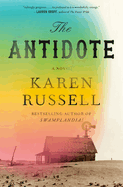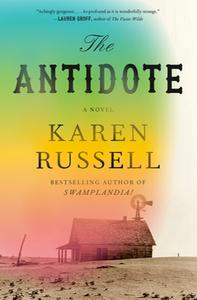
 It's been a considerable wait for Karen Russell--author of highly praised and eclectic short story collections including St. Lucy's Home for Girls Raised by Wolves--to produce another novel since her first, Swamplandia!, was a finalist for the Pulitzer Prize for Fiction in 2012. Happily, The Antidote, a deeply imagined blend of gritty realism and alluring fantasy about the American Midwest in the Dust Bowl era, will amply reward readers for their patience.
It's been a considerable wait for Karen Russell--author of highly praised and eclectic short story collections including St. Lucy's Home for Girls Raised by Wolves--to produce another novel since her first, Swamplandia!, was a finalist for the Pulitzer Prize for Fiction in 2012. Happily, The Antidote, a deeply imagined blend of gritty realism and alluring fantasy about the American Midwest in the Dust Bowl era, will amply reward readers for their patience.
On April 14, 1935--Black Sunday--a catastrophic "black blizzard" swept across the already beleaguered Great Plains of the United States. Russell's locus for her account of that devastating dust storm and its aftermath is the tiny fictional southwestern Nebraska town of Uz, an "ugly and uninviting place" that shares its name with Job's biblical homeland. The town, whose desperate citizens are "all in the market for miracles," is home to bachelor farmer Harp Oletsky and his 15-year-old basketball-obsessed niece, Asphodel, who becomes his ward when her mother falls victim to a serial killer terrorizing the region.
Another resident is immigrant Antonina Rossi, a "prairie witch" whose pseudonym provides the novel's title and who claims to store the memories townspeople share with her for a fee in her "Vault." They're joined by Cleo Allfrey, a young Black photographer who's been dispatched by the Roosevelt administration to document the farmers' plight in hopes of persuading Congress to fund New Deal aid programs.
Shifting among the voices of these characters, supplemented by periodic brief contributions from a sentient scarecrow, Russell exposes the scars they each bear from the events of their pasts and the hardships of daily life in a dying town. Most moving are the stories of Antonina's longing to be reunited with the son taken from her after she gave birth to him as a 15-year-old in a home for unwed mothers, and Asphodel's ache for the mother she barely knew. Russell energizes the plot with a brilliantly conceived, profoundly moving dose of magical realism involving Cleo's photography that becomes central to an effort to derail the reelection bid of Uz's corrupt sheriff and save an innocent young man from execution.
But like Cleo changing her lens from portrait to wide angle, Russell skillfully pulls back from the travails of her characters to excavate out of the formerly rich soil of this barren earth the story of how immigrants like Harp's Polish parents--fleeing German oppression in their homeland--ruthlessly displaced the Pawnee and other Native American tribes and then exploited the land in ways that set the stage for its eventual ruin. In doing so, Russell has created both a tender story of how our memories sustain us in the face of significant loss and a frank reckoning with a painful period of American history. --Harvey Freedenberg, freelance reviewer
Shelf Talker: Through the stories of four characters in a small Nebraska town, Karen Russell paints a moving and memorable portrait of the Dust Bowl era.

